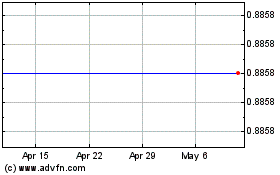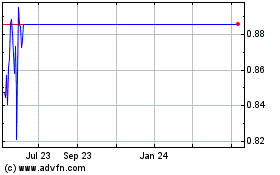By Matt Wirz and Julie Wernau in New York and Matina Stevis in Maputo, Mozambique
When a Lebanese defense contractor asked Credit Suisse Group AG
to finance sales of military ships to Mozambique, it looked like an
opportunity to turn a relationship with a wealthy businessman into
a lucrative deal.
Instead, it has embroiled the bank in a scandal that has spread
from the capital city of Maputo to financial centers around the
world.
Credit Suisse and a partner, Russian bank VTB Group, arranged $2
billion in debt for three state-owned companies fully or partly
owned by Mozambique's intelligence service. The deals helped boost
fees earned by Credit Suisse's investment bank and funded important
contracts for its client, Iskandar Safa, whose France-based
military-shipbuilding company was struggling.
But the deals also ballooned Mozambique's national debt by about
35% and financed military spending by the country as a decades-old
civil conflict flared back up. Much of the debt was kept secret for
more than a year, leading to a backlash from investors,
international donors and the country's Parliament after it was
reported by The Wall Street Journal in April.
This account, based on interviews with people involved in the
deals and offering documents, lays out the client relationships and
financial incentives that led Credit Suisse to take on deals that
have become an albatross for the bank. The transactions also cast a
rare spotlight on the ties between banks, defense contractors and
the countries they supply.
Mozambique now is struggling to repay the money it borrowed as
it contends with drought-related food shortages and intensifying
violence.
The U.K.'s Financial Conduct Authority has begun looking into
whether Credit Suisse and VTB misled investors when some of the
debt was raised and subsequently restructured, people familiar with
the matter said. Credit Suisse is also the subject of an inquiry by
Switzerland's financial regulator, another person familiar with the
matter said. Both banks used their U.K. operations to handle the
bonds.
"We have been open and transparent with the regulator on the
Mozambique transaction and are not aware of any investigations," a
spokeswoman for VTB said. Credit Suisse declined to comment.
Privately, Credit Suisse's top executives have recently
expressed concerns about the deals, calling them the wrong type of
business for the bank.
"You're talking about a country with extreme health and poverty
needs," said Anne Frühauf, head of southern Africa research at
political risk consultant Teneo Intelligence. "If there had been a
proper prioritization of public-investment needs, neither of these
projects would have seen the light of day."
The deals included $622 million in loans to buy military
equipment and $850 million in bonds for tuna-boat purchases
arranged by both banks in 2013. Some bond proceeds later went to
military purchases. In early 2014, VTB arranged a $535 million loan
to build a shipyard to service military and fishing fleets.
International pressure mounted this month for Mozambique to
clarify how the money was spent. The International Monetary Fund,
U.K. High Commissioner to Mozambique Joanna Kuenssberg and U.S.
Ambassador Dean Pittman both called on Mozambique's ruling party,
Frelimo, to allow an independent forensic audit of the government's
accounts. The IMF and a dozen donors have cut off about $320
million in aid since the loans came to light.
The roots of the debt offerings go back to 2010 and the
discovery of large offshore natural-gas fields in Mozambique, one
of the world's poorest countries with 27 million people and a gross
domestic product of about $16 billion.
The prospect of new wealth fanned tensions between Frelimo and
the opposition party, Renamo, which had fought a civil war until a
1992 truce. António do Rosário, chief executive officer of the
three state-owned companies that borrowed the money, said the
government wanted to protect the gas fields and invest in related
businesses.
"Our country has massive resources," Mr. do Rosário said. "In
parallel to these resources, we have threats."
The government picked Mr. Safa's company, Privinvest, to supply
ships, including patrol and surveillance vessels, and asked its
help getting financing. The company disputes the characterization
of the ships as military, saying they weren't outfitted with
weapons. Privinvest approached Credit Suisse about a loan for
Mozambique, and a committee of senior executives, including
then-CEO Gaël de Boissard, approved the deal.
Credit Suisse's top brass signed off in part because the bank
had pioneered a way to lend in developing countries without taking
on much risk.
The bank found it could purchase sovereign-debt insurance
through the Lloyd's of London insurance market to hedge as much as
90% of the loans against default. Credit Suisse charged higher
interest rates on the debt than its insurance premiums, pocketing
the difference mostly risk free.
The insurance policies Credit Suisse used only covered
governments. So when Mozambique wanted to borrow the money through
state-owned companies instead, the bank came up with a twist:
Mozambique would cosign.
Opposition politicians in Mozambique allege the administration
structured the borrowings to keep them secret and illegally
provided the government guarantee without Parliament's
approval.
"Information regarding these deals was carefully concealed from
the public and opposition parties," said Maria Ivone Soares,
Renamo's chairman in the Mozambican legislature, who is pushing for
an investigation.
Mr. do Rosário, CEO of the companies that borrowed the debt,
denies any wrongdoing. "The financings went through all legal
procedures," he said. "The specific nature of the debt and its
holder were classified for national security purposes."
Initially, the deals paid big dividends.
Credit Suisse collected fees from Privinvest and from
Mozambique, interest payments on the loans and bonds it kept, and
made trading profits on debt it sold to investors. Its revenue from
issuing bonds and loans around the globe jumped 18% in 2013, the
year Credit Suisse raised $1 billion of debt for Mozambique.
"The increase was driven by higher revenues in emerging markets,
particularly in structured lending," Credit Suisse said in its
annual report.
The deals also were a windfall for Constructions Mécaniques de
Normandie, a struggling subsidiary of Mr. Safa's Privinvest that
built some of the ships for Mozambique. CMN hadn't won a major
contract since 2003, former employees said. In 2014, CMN's revenue
jumped 186%, to EUR110 million ($124.3 million), well above the
annual average of EUR46 million for the five years before
Privinvest won the Mozambique contracts, according to data from
S&P Global Market Intelligence.
"CMN represents only 10% of the Privinvest group, which counts
many shipyards and facilities world-wide," a Privinvest spokesman
said.
Andrew Pearse, a former Credit Suisse banker who worked on some
of the Mozambican loans, now runs an investment firm majority-owned
by Mr. Safa's Privinvest. Mr. Pearse managed Credit Suisse's unit
responsible for lending in Europe, the Middle East and Africa until
June 2013, when he left to found the new firm, called Palomar
Capital Advisors AG, with startup capital from Privinvest. Palomar
later helped VTB arrange the shipyard loan.
In 2015, things began to fall apart for Mozambique and its
lenders.
The three state-owned companies had planned to repay the debt by
doing contract security work for international natural-gas
companies and by catching tuna. But foreign energy companies have
stopped most operations in Mozambique for now because of low gas
prices, and the country's tuna fishing fleet has been a bust.
The tuna enterprise, called Ematum, restructured its bonds this
past April by converting them into sovereign bonds that Mozambique
must eventually repay. Investors sold the new bonds for 70 cents on
the dollar this week, reflecting fears of a default.
The shipyard company, called MAM, missed a $178 million payment
on its loans in May and is negotiating a restructuring with VTB.
"We are working on restructuring the operations, and we are
optimistic of the future outcome," Mr. Do Rosário said.
Meanwhile, conditions in Mozambique are worsening. Its
foreign-currency reserves fell to $1.8 billion in May from $2
billion in January, and it is seeking $180 million in food aid.
Intensified fighting has sent more than 10,000 refugees to
neighboring Malawi, according to the U.N. High Commission for
Refugees.
"We need to have clarity on how the loans were made, what the
money was used for and if there's a possibility to recuperate any
of those funds," said Mr. Pittman, the U.S. ambassador to
Mozambique. "These were bad decisions, they were made in secret and
they will have consequences."
Write to Matt Wirz at matthieu.wirz@wsj.com, Julie Wernau at
Julie.Wernau@wsj.com and Matina Stevis at matina.stevis@wsj.com
(END) Dow Jones Newswires
June 29, 2016 11:46 ET (15:46 GMT)
Copyright (c) 2016 Dow Jones & Company, Inc.
Credit Suisse (NYSE:CS)
Historical Stock Chart
From Mar 2024 to Apr 2024

Credit Suisse (NYSE:CS)
Historical Stock Chart
From Apr 2023 to Apr 2024
